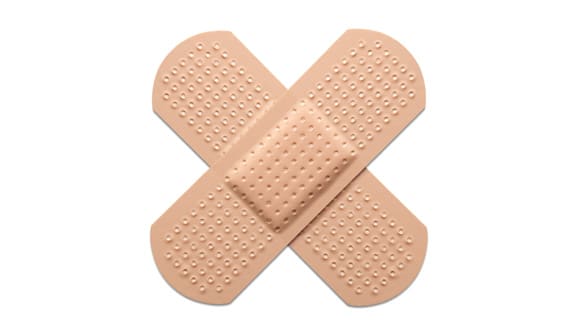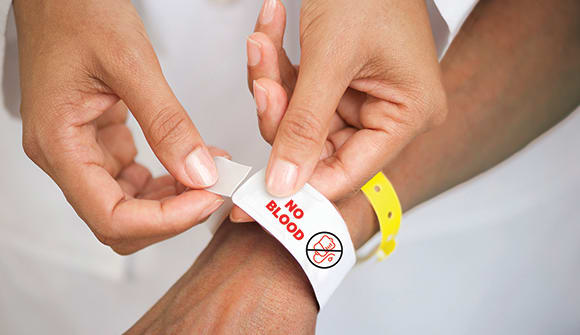First aid mistakes
What to do instead and when to see a doctor.
Article Author: Beverly Wong-Ken
Article Date:

From time to time, we all find ourselves playing doctor and treating minor injuries at home, but how can you know when you're in over your head? While your condition might not warrant a trip to the Emergency Room, mistreating it could do more harm than good.
Matthew Thompson, MD, is an emergency medicine physician with Emergency Resources Group who practices at Baptist Health and co-founder of Telescope Health, which powers Baptist HealthPlace On Demand. The app allows you to talk with trusted local emergency and family physicians around the clock without ever leaving your home.
3 first aid mistakes to avoid
Dr. Thompson outlined some of the common minor first aid mistakes he sees, explained how to fix them, and when to see the professionals.
Mistake 1: Trusting "Dr. Google"
The internet is full of answers to your health concerns, but which sources can you trust and how do you know what to do with all that information? Dr. Thompson said most people probably know to look for guidance from reputable health care organizations. However, self-diagnosis and research without guidance from experienced providers or advocates often leave patients with more questions than answers. Ultimately, this can lead to anxiety and fear – driving people to costly urgent or emergency care that’s disconnected from their primary care team.
What to do instead:
If you have questions, reach out to your primary care office and talk to a provider. Unfortunately, instant access to your doctor isn’t always possible. If you need an immediate evaluation by a physician, you can try a telehealth service. Telescope Health ensures that all Baptist HealthPlace patients can talk to a care navigator and sends a care summary along to their primary care physician. If you don’t have a primary care doctor, they can help you find one.
Mistake 2: Waiting too long
A big part of treating your own injury is determining when it's too much to handle on your own. Dr. Thompson warned waiting it out can lead to more problems.
"Often, I'll see people come into the Emergency Department for a cut or wound too late," he said. "Some wait until the next day, and at that point, they're frustrated because I can't suture the wound. This often means the scar formation is going to be worse, it's going to take longer to heal, and there's an increased risk for infection."
What to do instead:
"Trust your gut. If you have a deep cut and you think it needs to be looked at, always get it evaluated as quickly as possible," said Dr. Thompson. "The chance of us being able to repair it with a good cosmetic and functional outcome is much better the sooner we can see it."
Mistake 3: Applying heat first instead of cold
It can be hard to tell whether you need to apply heat to an injured area or cool it down. Dr. Thompson said one common mistake people make when treating a sprained ankle or wrist is applying heat to the injury right away, which will actually make the inflammation much worse. After the first 24 hours, though, alternating ice and heat for comfort is completely acceptable.
What to do instead:
"We recommend something called R.I.C.E. therapy: rest, ice, compression and elevation," said Dr. Thompson.
Rest is essential. You'll want to minimize the injury you sustained and give the sprain time to heal.
Ice is a natural anti-inflammatory that helps decrease swelling. Wrap ice or a cold compress in a light towel and apply it to the sprain right away.
Compression achieved by wrapping the injury will help prevent swelling by keeping fluid from pooling.
Elevation of the injured area also keeps fluids from pooling and helps to minimize swelling.
Get help at home
If you're unsure how to treat a condition or simply have questions for a professional, Dr. Thompson recommended scheduling a visit with Baptist HealthPlace On Demand.
"This service is really putting an emergency physician at your fingertip. We have people who call in all the time for anything from prescription refills and questions about minor injuries to those experiencing serious symptoms and looking for advice on what they should do next," said Dr. Thompson. "We can help answer any of those questions and if you do need a greater level of care, we can help arrange that and will be there for you throughout that whole process."
Do you have questions or concerns about your personal health?
You can make an appointment with a Baptist Primary Care physician near you by calling 904.202.4YOU or filling out the appointment request form. If you're looking to connect online with a trusted local doctor any time, get started with Baptist HealthPlace On Demand.
If you're experiencing a medical emergency, don't delay care. Call 911 or visit your closest emergency room immediately. For more information about Baptist Health's ER locations, including NEW locations in St. Augustine and Nassau Crossing, and wait times, click here.



